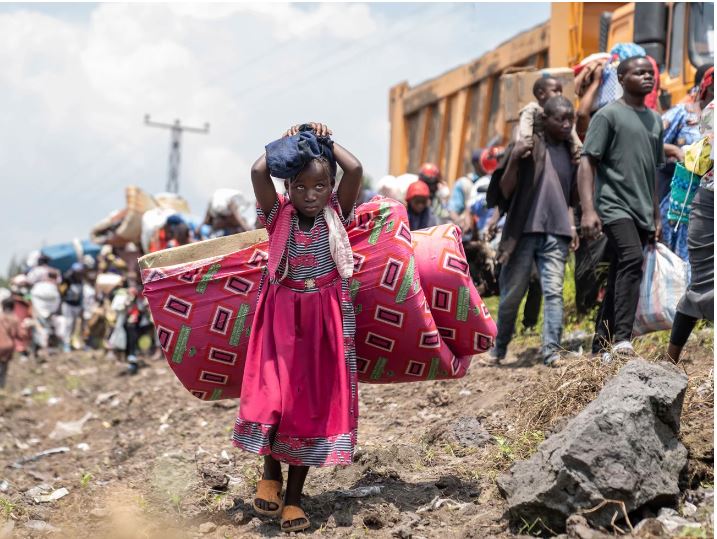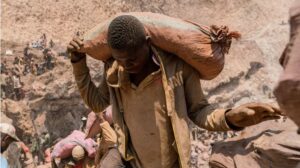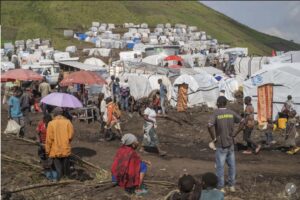
.
Smartphones, electric cars and e-cigarettes are now commonplace symbols of ‘progress’ in the modern world. Global sales of e-cigarettes are projected to reach $47.5 billion by 2028. Smartphones sales were worth more than $500 billion this year and electric vehicles (2023) $550 billion.
These products (and many related items) are all useless without metals and rare earth minerals like cobalt and coltan. Cobalt is considered essential in the batteries that power electric vehicles. Coltan is needed in gaming consoles and smartphones, .
As much as 70 percent of the world’s cobalt supply comes from the Democratic Republic of Congo (DRC) where coltan is also in plentiful supply. The contrast between the swish hum of electric cars, the technological sparkle of gaming consoles / smartphones and the mining of the necessary minerals could not be more stark.
The working conditions for many of Congo’s so called ‘artisanal’ (freelance) cobalt miners are described as modern day slavery: child labour is commonplace and supports child abductions and trafficking. While such artisanal mining is technically illegal in Congo, it takes place alongside and is intertwined with hi-tech extraction operations ran by Chinese and Swiss mining concerns. It is simply a cheap way to boost production and profits.
Alongside the ongoing exploitation of the populace of what remains one of the world’s poorest countries, there is concomitant environmental destruction with devastated landscapes, polluted water, contaminated crops and poisoned soil. Cobalt is a ‘possible’ carcinogen, and being a radioactive element poses an immense hazard to human health. Studies have shown that the risk of birth defects, such as limb abnormalities and spina bifida, greatly increased when a parent worked in a cobalt mine.
While there are occasional flare ups in the public consciousness about the use of child labour in the DRC, these are quickly forgotten and as long as the cobalt keeps flowing it seems the modern world is happy to look the other way.
Of course, where there are resources of interest to global capitalism there is conflict. More than 6 million people have died in the DRC since 1996 where war continues to rage. Predictably the violence is fuelled by the easy availability of mineral resources in the eastern DRC and a cheap labour force to mine them: the proceeds of mining are spent on weapons with which to fight over the mines.
The most active militia in Eastern DRC at present are the M23 group: widely believed to be backed by neighbouring Rwanda, they have made significant gains in the east in recent months in their battle against the Congolese armed forces (FARDC).
China dominates the legal mining operations in the DRC with 15 out of 17 mines. Western interests in cobalt and copper are represented by mining giant Glencore and the UAE mines for tin, titanium, tungsten and gold.
Needless to say, if one scratches the surface of the violence in the DRC, one finds western tech giants in the middle of it – accused of directly fuelling bloodshed.
Apple stands accused of purchasing minerals mined by child and veritable slave labour in the DRC, by illegally smuggling them out of the DRC and into Rwanda, where their origin in the global supply chain is obscured.
‘We have to challenge what is really a global big lie – that somehow a country like Rwanda, which is mineral poor, can be responsible for exporting these massive quantities,’ a DRC government spokesperson told American broadcaster CBS.
Evidence from whistleblowers has shown how tech giants are sourcing cobalt from illegal mines located in conflict zones taken by M23 and other groups, but efforts to hold these companies to account have been blocked in Western courts.
In 2019, a case brought by the International Rights Advocates against Apple, Google, Microsoft, Dell, and Tesla for ignoring child labour laws while mining cobalt in the DRC was quashed by a US federal appeals court. In their ruling, the judge said there was not enough evidence to hold the tech giants accountable. Of the DRC’s 255,000 miners, 40,000 are reportedly children, some as young as six, working in horrific conditions.
Once extracted, cobalt re-emerges in Rwanda’s thriving black markets, with supply lines overseen by M23, which has started seizing entire mining towns and leaving mass graves in their wake. Rwanda has become something of a darling for the West and was the ‘safe country’ that the UK wanted to deport asylum seekers to.
Apple alone made $100 billion last year and while Silicon Valley basks in profits, 75 per cent of DRC’s people still live on $2 a day.
There is no NEED for the people of the DRC to be exploited, no need for the ongoing violence that has displaced half a million, no need for the surge in robberies, shootings, extortion and rape as more than 250 local and 14 foreign armed groups fight for mines and territory – but it will go on as long as big tech companies are allowed to boost profits by purchasing via a wholly unethical supply chain.
We are all complicit every time we turn on a smartphone, although many (most) are simply unaware of the cost being paid by some of the world’s poorest and most vulnerable people. The violence and exploitation in the DRC does not make your smartphone cheaper for YOU, it makes them more profitable for THEM. It’s just a way for ultra-rich companies to squeeze a bit more shareholder value out of an already lucrative market.
Writing this article has been an education for me. Once we know, our moral duty is clear: we must not abandon the people of the DRC to be sacrificed at the altar of global capitalism. Those recently radicalised by events in Gaza should be just as enraged by events in Congo.


More Stories
Ukraine pays the price for the West’s addiction to propaganda over reality
Radical Friendship 2: Healing the divisive human need for certainty
Nobody should be surprised that Fascism is on the march across Europe.